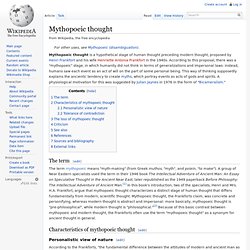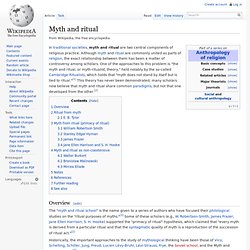

Allegory. Personification. Mythopoeic thought. The term[edit] The term mythopoeic means "myth-making" (from Greek muthos, "myth", and poiein, "to make").

A group of Near Eastern specialists used the term in their 1946 book The Intellectual Adventure of Ancient Man: An Essay on Speculative Thought in the Ancient Near East, later republished as the 1949 paperback Before Philosophy: The Intellectual Adventure of Ancient Man.[1] In this book's introduction, two of the specialists, Henri and Mrs. H.A. Frankfort, argue that mythopoeic thought characterizes a distinct stage of human thought that differs fundamentally from modern, scientific thought. Mythopoeic thought, the Frankforts claim, was concrete and personifying, whereas modern thought is abstract and impersonal: more basically, mythopoeic thought is "pre-philosophical", while modern thought is "philosophical.
Myth-ritual theory. Myth and ritual. In traditional societies, myth and ritual are two central components of religious practice.

Although myth and ritual are commonly united as parts of religion, the exact relationship between them has been a matter of controversy among scholars. One of the approaches to this problem is "the myth and ritual, or myth-ritualist, theory," held notably by the so-called Cambridge Ritualists, which holds that "myth does not stand by itself but is tied to ritual. Mythopoeia.